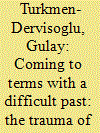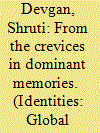| Srl | Item |
| 1 |
ID:
123127


|
|
|
|
|
| Publication |
2013.
|
| Summary/Abstract |
This paper takes as its subject the question of why some nations are less willing to acknowledge past atrocities. To answer that question, it focuses on the assassination of Hrant Dink - a Turkish-Armenian journalist - and its repercussions on Turkish national identity. Scrutinising newspaper articles written before and after the assassination (2004-2007), it casts a detailed glance at the struggle between two carrier groups - pro- and anti-acknowledgement groups - and argues that the assassination increased the likelihood of the acknowledgement of the mass killing of Armenians in 1915 by creating a cultural trauma informed by collective guilt. However, the relief generated by the funeral, combined with the strength of the master commemorative narrative regarding the mass killings, decreased that likelihood, and despite the huge public reaction created by the assassination there was no attempt at acknowledgement. As such, the paper contributes to our understanding of the trauma of perpetrators and claims that, in addition to other factors listed by earlier studies, cultural trauma is a necessary but not a sufficient condition for coming to terms with difficult pasts.
|
|
|
|
|
|
|
|
|
|
|
|
|
|
|
|
| 2 |
ID:
119388


|
|
|
|
|
| Publication |
2013.
|
| Summary/Abstract |
Dominant collective memories around the anti-Sikh violence of 1984 are mostly dichotomous. The official state memories of 1984 are replete with omissions about the attack on Sikhs and several human rights violations. On the other hand, the counter-mobilisations that developed in the aftermath of 1984 are largely focused on the demand for a separate state of Khalistan. I problematise these dichotomous framings by examining what I call present-day 'virtual commemorative crevices'. I suggest that these crevices are transnational, sacred or set-apart and liminal fissures in hegemonic memories and institutionalised forms of commemoration. I examine eight websites focusing on 1984 and the role of the Sikh diaspora in disrupting older temporal fixities and spatially rooted narratives. Virtual fissures mark a subtle, but significant shift from polarised hegemonic narratives to a more differentiated, future-oriented activism.
|
|
|
|
|
|
|
|
|
|
|
|
|
|
|
|
| 3 |
ID:
123125


|
|
|
|
|
| Publication |
2013.
|
| Summary/Abstract |
Nationalism theorists have noted the link between traumatic events and national identity, and cultural trauma theory presents a framework for understanding how these events become trauma narratives. I argue for greater consideration of how these narratives are strategically linked to ideological frames of national identity. A case study of post-Independence India considering the assassination of Mahatma Gandhi and the Partition of India and Pakistan demonstrates how two very different events were promoted as cultural traumas by various carrier groups in order to promote a secular vision of the Indian nation. Adapting Armstrong and Crage (2006), I suggest that the success of these trauma narratives depend on several criteria: the ease of narrating the event, how it is linked to underlying cultural meanings/frames and how the event interacts with historical contingencies.
|
|
|
|
|
|
|
|
|
|
|
|
|
|
|
|